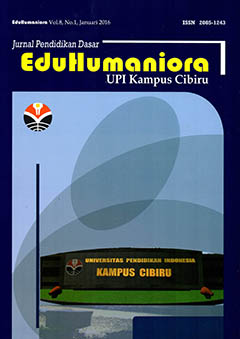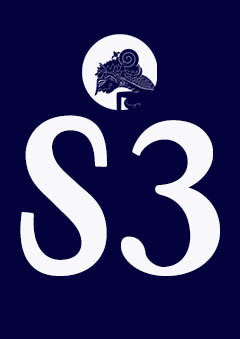Ethnoscience and Web-based Learning Media to Maintain Cultural Awareness in Science Classroom: An Exploratory Sequential Study
Abstract
Keywords
Full Text:
PDFReferences
Aikens, K., & McKenzie, M. (2021). A comparative analysis of environment and sustainability in policy across subnational education systems. Journal of Environmental Education, 52(2), 69–82. https://doi.org/10.1080/00958964.2021.1887685
Arifiani, I., Rokhimawan, M. A., & Rahmawan, S. (2022). Pengembangan media pembelajaran web google sites materi sifat koligatif larutan kelas XII IPA. Jurnal Riset Pendidikan Kimia (JRPK), 12(2), 89–99.
Arumingtyas, P. (2021). Peningkatan Kedisiplinan Belajar Peserta Didik Melalui Media Google Sites. Kalam Cendekia: Jurnal Ilmiah Kependidikan, 9(1).
Baker, W. (2012). From cultural awareness to intercultural awareness: culture in ELT. ELT Journal, 66(1), 62–70. https://doi.org/10.1093/elt/ccr017
Barak, M., & Ziv, S. (2013). Wandering: A Web-based platform for the creation of location-based interactive learning objects. Computers & Education, 62, 159–170.
Barry, D. M., Kanematsu, H., Nakahira, K., & Ogawa, N. (2018). Virtual workshop for creative teaching of STEM courses. Procedia Computer Science, 126, 927–936. https://doi.org/https://doi.org/10.1016/j.procs.2018.08.027
Cohen, L., Manion, L., & Morrison, K. (2017). Validity and reliability. In Research methods in education (pp. 245–284). Routledge.
Creswell, J. W., & Clark, V. L. P. (2011). Choosing a mixed methods design. In Designing and Conducting Mixed Methods Research (pp. 53–106). Sage Publications, Inc.
Dewi, C. A., Erna, M., Martini, Haris, I., & Kundera, I. N. (2021). Effect of Contextual Collaborative Learning Based Ethnoscience to Increase Student’s Scientific Literacy Ability. Journal of Turkish Science Education, 18(3). https://doi.org/10.36681/tused.2021.88
Dewi, C. A., Khery, Y., & Erna, M. (2019). An ethnoscience study in chemistry learning to develop scientific literacy. Jurnal Pendidikan IPA Indonesia, 8(2), 279–287. https://doi.org/10.15294/jpii.v8i2.19261
Dewi, N. C. (2020). Pengembangan E-Learning Berbasis Google Sites Untuk Meningkatkan Prestasi Belajar Siswa. Diadik: Jurnal Ilmiah Teknologi Pendidikan, 10(1), 210–216.
Drost, E. A. (2011). Validity and reliability in social science research. Education Research and Perspectives, 38(1), 105–123.
Emerson, R. W. (2017). Likert scales. Journal of Visual Impairment & Blindness, 111(5), 488–489.
Fasasi, R. A. (2017). Effects of ethnoscience instruction, school location, and parental educational status on learners’ attitude towards science. International Journal of Science Education, 39(5), 548–564. https://doi.org/10.1080/09500693.2017.1296599
Febrina, T., Leonard, L., & Astriani, M. M. (2020). Pengembangan Modul Elektronik Matematika Berbasis Web. JKPM (Jurnal Kajian Pendidikan Matematika), 6(1), 27–36.
Hidayat, R. (2018). Development of Web-Based Learning Media in the Subject of Research Methodology (Supporting Blended Learning System) at Kartanagara University. International Conference on Education and Technology (ICET 2018), 176–181.
Koirala, K. P. (2022). Ethno science practice as Indigenous wisdom: challenges to braiding with Western-based school science curriculum. Diaspora, Indigenous, and Minority Education, 1–13. https://doi.org/10.1080/15595692.2022.2138321
Makinde, S. O. (2020). Influence of Social/Mass Media as a Change Agent on Childhood Social Pedagogy and Achievement. Indonesian Journal of Early Childhood Education Studies, 9(1), 1–7.
Miles, M. B., & Huberman, A. M. (1994). Qualitative data analysis: An expanded sourcebook. sage.
Mukti, W. M., & Anggraeni, Z. D. (2020). Media pembelajaran fisika berbasis web menggunakan Google sites pada materi listrik statis. FKIP E-Proceeding, 5(1), 51–59.
Naila, I. (2020). The Effectiveness of Science Project Learning based on Entrepreneurship Model to Improve Elementary Students’ Collaborative Skills. Mimbar Sekolah Dasar, 7(3), 348–361. https://doi.org/https://doi.org/10.17509/mimbar-sd.v7i3.28676
Naila, I. (2023). The Analysis of Online Learning Using Microsoft Teams on Third-grade Elementary School Students’ Motivation. KnE Social Sciences, 8(8 SE-Articles). https://doi.org/10.18502/kss.v8i8.13290
Naila, I., Ridlwan, M., & Nurdianah, L. (2022). Using ECL Media to Improve Information Literacy of Islamic Elementary School Students. Elementary School Forum (Mimbar Sekolah Dasar), 9(2), 289–302.
Pahrudin, A., Irwandani, Triyana, E., Oktarisa, Y., & Anwar, C. (2019). The analysis of pre-service physics teachers in scientific literacy: Focus on the competence and knowledge aspects. Jurnal Pendidikan IPA Indonesia, 8(1). https://doi.org/10.15294/jpii.v8i1.15728
Pakaya, W. C., Sutadji, E., Dina, L. N. A. B., Rahma, F. I., Mashfufah, A., & Ayu, I. R. (2023). Metode Penelitian Pendidikan. Nawa Litera Publishing.
Pertiwi, I. E., & Purnawarman, P. (2023). GOOGLE SITES AS AN E-LEARNING MODULE FOR ONLINE LEARNING: A MODE OF CHOICE DURING THE COVID-19 PANDEMIC. PROJECT (Professional Journal of English Education), 6(1), 187–200.
Ploj Virtič, M. (2022). Teaching science & technology: components of scientific literacy and insight into the steps of research. International Journal of Science Education, 1–16. https://doi.org/10.1080/09500693.2022.2105414
Priyatno, D. (2016). Belajar alat analisis data dan cara pengolahannya dengan SPSS. Yogyakarta: Gava Media.
Purnama, S., Ulfah, M., Machali, I., Wibowo, A., & Narmaditya, B. S. (2021). Does digital literacy influence students’ online risk? Evidence from Covid-19. Heliyon, 7(6), e07406. https://doi.org/https://doi.org/10.1016/j.heliyon.2021.e07406
Rahmadayanti, D., & Hartoyo, A. (2022). Potret Kurikulum Merdeka, Wujud Merdeka Belajar di Sekolah Dasar. Jurnal Basicedu, 6(4), 7174–7187.
Schoonenboom, J., & Johnson, R. B. (2017). How to construct a mixed methods research design. Kolner Zeitschrift Fur Soziologie Und Sozialpsychologie, 69(Suppl 2), 107. https://doi.org/https://doi.org/10.1007%2Fs11577-017-0454-1
Setiyowati, R. (2021). Web-Based Learning Media of Population and Environmental Educational Subject. 4th Sriwijaya University Learning and Education International Conference (SULE-IC 2020), 139–145. https://doi.org/https://doi.org/10.2991/assehr.k.201230.096
Solheri, S., Azhar, M., & Yohandri, Y. (2022). Analysis of ethnoscience integrated environmental literacy for junior high school. JPBI (Jurnal Pendidikan Biologi Indonesia), 8(2), 178–188. https://doi.org/https://doi.org/10.22219/jpbi.v8i2.17657
Sulistri, E., Sunarsih, E., Utama, E., & Moseki, U. (2020). The Development of Digital Pocketbook Based on the Ethnoscience of the Singkawang City to Increase Students’ Scientific Literacy on Heat Matter and Its Transfer. Journal of Education, Teaching and Learning, 5(2), 263–268.
Sundayana, R. (2014). Statistika penelitian pendidikan. Bandung: Alfabeta.
Tomalin, B., & Stempleski, S. (2013). Cultural Awareness-Resource Books for Teachers. Oxford University Press.
Vhalery, R., Setyastanto, A. M., & Leksono, A. W. (2022). Kurikulum Merdeka Belajar Kampus Merdeka: Sebuah Kajian Literatur. Research and Development Journal of Education, 8(1), 185–201.
Waluyo, J. (2021). Persepsi Peserta Pelatihan Terhadap Pemanfaatan Google Sites Dalam Pembelajaran. Andragogi: Jurnal Diklat Teknis Pendidikan Dan Keagamaan, 9(2), 190–199.
Wen, X., & Walters, S. M. (2022). The Impact of Technology on Students’ Writing Performances in Elementary Classrooms: A Meta-Analysis. Computers and Education Open, 3, 100082. https://doi.org/https://doi.org/10.1016/j.caeo.2022.100082
Widianto, E. (2021). Pemanfaatan Media Pembelajaran Berbasis Teknologi Informasi. Journal of Education and Teaching, 2(2), 213–224. https://doi.org/http://dx.doi.org/10.24014/jete.v2i2.11707
Yin, J., Goh, T.-T., Yang, B., & Xiaobin, Y. (2021). Conversation technology with micro-learning: The impact of chatbot-based learning on students’ learning motivation and performance. Journal of Educational Computing Research, 59(1), 154–177. https://doi.org/https://doi.org/10.1177/0735633120952067
Yu, Z., Yu, L., Xu, Q., Xu, W., & Wu, P. (2022). Effects of mobile learning technologies and social media tools on student engagement and learning outcomes of English learning. Technology, Pedagogy and Education, 31(3), 381–398. https://doi.org/10.1080/1475939X.2022.2045215
Yuliana, I., Cahyono, M. E., Widodo, W., & Irwanto, I. (2021). The effect of ethnoscience-themed picture books embedded within contextbased learning on students’ scientific literacy. Eurasian Journal of Educational Research, 2021(92). https://doi.org/10.14689/ejer.2021.92.16
DOI: https://doi.org/10.17509/eh.v16i2.70749
Refbacks
- There are currently no refbacks.
Copyright (c) 2024 EduHumaniora | Jurnal Pendidikan Dasar Kampus Cibiru
EduHumaniora: Jurnal Pendidikan Dasar
Published in collaboration Program Studi PGSD UPI Kampus Cibiru
and
HDPGSDI
This work is licensed under a Creative Commons Attribution-ShareAlike 4.0 International License.















